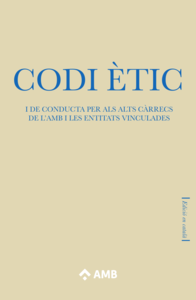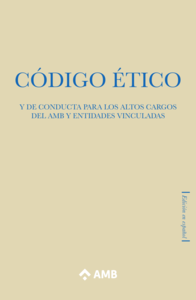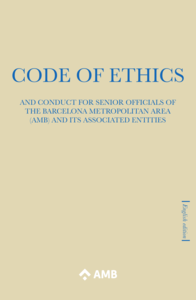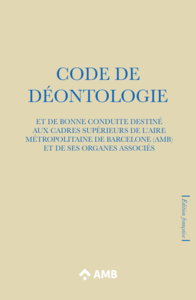Preamble and principles
Article 55.1 of Law 19/2014, of 29 December, on transparency, access to public information and good governance, specifies the principles and rules of conduct that must guide the actions of senior officials. Section 3 of this article states that "the government, local authorities and other public bodies and institutions included in Article 3.1 must draw up a code of conduct for their senior officials that will specify and develop the principles of action referred to in Section 1, establish other additional ones where appropriate, and determine the consequences of not complying with them, without prejudice to the penalty system established by this law". By approving this Code of Ethics and Conduct as a self-regulatory instrument for senior officials, the Metropolitan Area of ??Barcelona complies with this legal obligation.
The Transparency Agency of the Metropolitan Area of ??Barcelona, ??for its part, states that "it bases its action on a series of principles and values ??that define good governance, are based on the fostering of personal commitment, and are reflected in corporate teamwork".
These principles are the following:
— Legality
— Responsibility
— Integrity
— Accountability
— Right to information
— Objectivity
— Public ethics
— Equity
Each of these principles expresses, in one way or another, the correspondence that must exist between the rights of citizens and the duties of those who have agreed to guarantee these rights. In addition to observing the principle of legality, senior officials hold the main responsibility for complying with and enforcing the law and for adapting or interpreting it in accordance with the circumstances of each situation for the benefit of the general interest and good governance. This responsibility entails making responsible and ethical use of their position and meeting the requirement of managerial discretion in the duties entrusted to them. The Code of Ethics and Conduct, as a system of institutional integrity, must be a guarantee for the senior officials that sign it, in the sense that it offers them a tool for ethical self-regulation, reinforcing the regulations but not reproducing them, and therefore guiding and protecting them in situations of behaviour that may compromise ethics.
Transparency is the necessary condition for satisfying the right to information, a right that must be guaranteed with diligence, impartiality, honesty and loyalty. Citizens must be able to enjoy equal access to the information they need with equal treatment, and they must be aware of the functioning and activity of the public administrations. Transparency and good governance should make it possible for citizens to continually monitor and evaluate political and administrative actions. A transparent administration is an administration that accounts for its functioning and thus encourages citizen participation.
The Charter of Fundamental Rights of the European Union of 7 December 2000, incorporated into the Treaty of Lisbon, introduced citizens' right to good administration (Art. 41), promoting codes of conduct and organizational simplification.
Insofar as the Code of Ethics and Conduct presents the risks and malpractices that may arise from non-compliance with the commitment to transparency and good governance, it is a tool that facilitates the assumption of responsibilities by senior officials and the habit of being accountable for actions taken.
The behaviour of the councillors of the AMB must always correspond to the public trust deposited in them as elected officials. They must always exercise their powers with integrity and honesty, ensuring that they do not enter into any conflicts of interest or other situations that may unduly condition the exercise of their representative position. For this reason, they must always maintain a respectful behaviour and an exemplary attitude towards the other councillors and towards citizens. This behaviour should always involve the use of correct language and relations based on constructive and cordial interaction and dialogue with all people and all groups, without exclusion.
Likewise, the ethical dimension that forms part of senior management goes beyond compliance with the law: first, it reinforces the sense of responsibility and knowledge of the law and, second, it reinforces the individual and organizational capacity to promote best practices. Nevertheless, a code of ethics and conduct cannot reiterate compliance with the existing regulations or limit their validity.
In the area of ??metropolitan regulation, without prejudice to any reforms that may be made, the current Organic Metropolitan Regulations establish the following:
Art. 1.2. Object of the regulations: formulation of the principles of transparency of the Institution's activity in the regulation of access to information and in the participation of citizens and municipalities and entities in the Metropolitan Area
Art. 73. Principles of transparency and participation
73.1. The AMB adopts the aim and obligation of broadening and increasing the transparency of its activities, and recognizes and guarantees the right of citizens and municipalities to access information on these public activities.
73.4. The AMB will ensure that this culture of transparency and participation is incorporated into the practices and working methods of all its services and departments, and that these draft and publish regularly updated information on their activities related to the operation of public services, so as to ensure transparency, monitoring and control.
The Transparency Agency, as the guarantee body of the AMB and its associated entities, will ensure compliance with this Code of Ethics and Conduct and the evaluation of this compliance, in the conviction that it must be an effective and credible tool in its functioning and deployment and in the continued evaluation of its fulfilment.
1. Obligated subjects
The present code applies to persons in representative positions, all members of the Metropolitan Council, the senior officials and managers of the AMB (the general manager and the area and service managers) and those of the associated entities that have a similar position.
The adherence of senior officials to this code of ethics will be actively announced on the portal, and will be mandatory.
Senior officers must adhere to the Code of Ethics and Conduct when they occupy their positions or join the organization; senior officials who are already members of the organization must adhere to it when it is approved.
2. Ethics in public information and accountability
The commitment to transparency means that it is obligatory to make public especially all important actions that are relevant with regard to the accountability of public activity and those that, by their nature, could be susceptible to malfeasance.
The information that is explained below must be made public or accounted for to the internal guarantee system and to the responsible administration:
2.1. Traceability of public money. The use of material resources in order to show compliance with budgetary legality and the elimination of any expenditure not clearly linked to institutional obligations.
2.2. A culture of merit in management positions. The professional merit and curriculum of each senior official and manager, in addition to the payments, compensations and expenses that are assigned to them.
2.3. A public schedule in relation to stakeholders. The schedule of senior officials in their interaction with stakeholders in the monitoring system implemented by the Transparency Agency in order to exercise accountability in their work.
2.4. Compatibilities. The conditions of incompatibility and declarations of compatibility of senior officials must be communicated in a timely manner from the time of their appointment to the time when they leave their posts, in addition to their declarations of assets.
2.5. Public procurement. Public procurement procedures must be made public in accordance with the law. Best practices must be promoted, and compliance with the regulations on transparency and good governance in public procurement approved by the Metropolitan Council must be ensured.
2.6. Selection and recruitment of staff. Staff must be selected and recruited in compliance with the law. Best practices must be promoted, conflicts of interest must be avoided and openness of public information and free competition must be guaranteed in all processes.
2.7. Conflicts of interest. In order to promote a culture of integrity and the prevention of conflicts of interest, and to guarantee the prevalence of public interest over private interests, the questionnaire annexed to this code must be signed. In cases of doubt regarding conflicts of interest, the person involved must refrain from acting.
2.8. Right of access. Publishing the report and showing diligence in dealing with requests for information from users and in requests by citizens for right of access, following the established procedures.
2.9. Publication of criteria. Drafting objective criteria based on decision making and making them public in both individual resolutions or actions and in the management of teams.
2.10. Subjection to commitments of governing bodies. Elected officials must make public any commitments made by the governing bodies and be accountable to citizens in all public actions carried out.
3. Ethics in senior management
Taking on managerial responsibility entails a high level of requirement of integrity, responsibility, teamwork and self-criticism. Good governance requires ethical criteria and norms of conduct that foster ethical leadership.
3.1. Institutional responsibility and loyalty. Taking on the management of managerial discretion in each area in a responsible manner, and justifying decisions objectively. Integrating the general interest and the common good as a guiding and prioritizing criterion in metropolitan management, applying the utmost institutional loyalty and taking into account public information and statements by the public.
3.2. Quality and austerity. Ensuring good management of expenditure, with criteria of prudence and austerity, giving priority to the general interest and direct service to citizens. To this end, the ethical dimension of decision making, evaluation by merit and allocation of expenditure must be strengthened.
3.3. Equity and non-discrimination. Involvement in reinforcing the working conditions of staff, promoting a culture of quality in working conditions with defined structures and established duties, promoting equal opportunities for men and women, and avoiding any form of discrimination.
3.4. Diligence in compliance with the law. Fostering decision making based on the law, knowing the content of regulations and laws and the procedures for transparency and good governance, and exercising the utmost diligence in their implementation. Senior officials may not accept any type of incentive, gift or benefit that is related to any type of decision making or is offered because of the position occupied.
3.5. Veracity and integrity. Accepting ethics as a tool for preventing criminal risks and conflicts of interest, and filling in the questionnaires with veracity and objectivity. Ensuring that staff recruitment is based on ability and not on political affinities or family ties. Refraining from participating in decision making when the interests converge directly or indirectly with personal or partisan interests, or ones that involve benefits to associated third parties.
3.6. Horizontal vision and professionalism. Working in a culture of shared decisions; promoting horizontal management to ensure a good work environment, professional competence and the empowerment of workers.
3.7. Training and self-demandingness. Encouraging continuous training and the exchange of best practices in collaboration between administrations, as well as in the ability to exchange data and to integrate and complement services. Innovation, excellence and modernization in administrative tasks must be encouraged.
3.8. Determination and commitment. Believing in the capacity of constructive creativity and in the ethical dimension offered by transparency and good governance as a new working culture. Making a commitment to this conviction in day-to-day management, both in monitoring the protection of public goods and in promoting transformative action.
3.9. Attention and service. Making an effort to limit bureaucracy in procedures in order to prioritize citizen service, accessibility and flexibility in procedures and information. Ensuring that existing services and programmes are not duplicated, and offering full cooperation with the local authorities and the various services of the Metropolitan Area.
3.10. Courage and honesty. Protecting and respecting public servers who warn of risks of malfeasance or irregularities related to the Code of Ethics and Conduct, transferring the information to the Transparency Agency and channelling the decision making in order to resolve any incidents and determine their solution, including, if applicable, the right to rectification in case of possible violations of the right to honour.
3.11. Confidentiality. Guaranteeing confidentiality and reservation in procedures that require it, prioritizing the right to privacy of workers and citizens, and observing secrecy and safekeeping in communications and documents that require them.
3.12. Big data and use of technology. Refraining from using the data obtained by technological means or in the monitoring of electronic data in the Metropolitan Area in an interested or commercial way or one that is alien to the interest of the service.
4. Involvement in transparency and good governance and collaboration with the Transparency Agency
4.1. Availability and cooperation. Senior officials must show a collaborative attitude towards the Transparency Agency, as the body that guarantees the application of the Code of Ethics and Conduct, as well as towards the internal and external control services for compliance with this code, by delivering information and following the recommendations arising from the regulations regarding ??transparency and good governance.
4.2. Dissemination and training. Knowledge of this Code of Ethics and Conduct must be promoted through internal training, monitoring, and identification of any incidents that occur in its implementation. Application of the code by third parties that are related to the administration must be facilitated.
4.3. Indemnity guarantee. Senior officials must be offered guarantees of confidentiality and protection against any pressures that may be placed on them to carry out acts that are incompatible with the Code of Ethics and Conduct and against any consequences of their warning of malfeasance. Senior officials must also offer such guarantees to their subordinates.
4.4. Guarantee. The Metropolitan Transparency Advisory Council, a body of the Transparency Agency for discussion, deliberation and support, is constituted as means for resolving any doubts that may arise and for establishing the criteria for interpreting specific cases, as a non-binding tool for help, support, protection and control.
4.5. Evaluation and monitoring. Senior officials must collaborate in the drafting of an annual report on compliance with the Code of Ethics and Conduct that will disseminate it and allow it to be evaluated by the Transparency Agency based on the indicators that are used in its external evaluation.
4.6. Penalty system. Compliance with this code is linked to the penalty provision of Law 19/2014, of 29 December, on transparency, access to public information and good governance. Powers are granted to the Transparency Agency as the guarantee body for investigating and proposing disciplinary action. The president of the AMB is responsible for making decisions.




